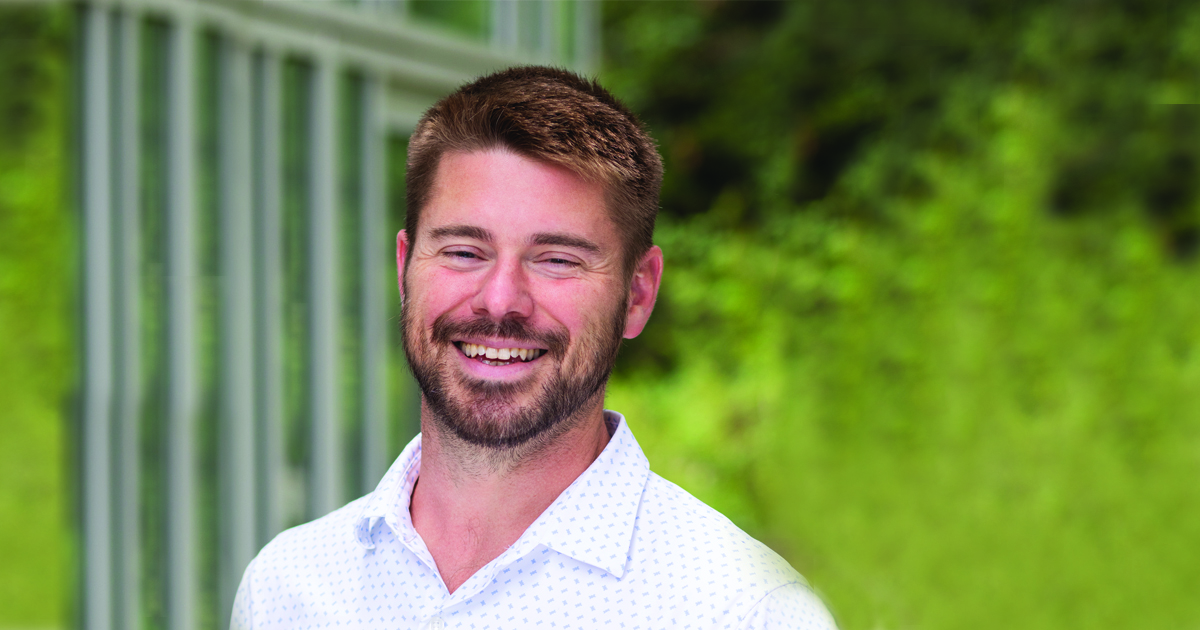New MAST Chair Means Business

Nathan Karst plays an internal game at the start of each semester as his classrooms fill with new faces.
It’s only a matter of time before the enthusiastic Babson College professor of applied mathematics will prove to his business-focused students just how interesting and important math and science are in their careers and everyday lives.
“There’s this buy-in that happens, and it’s not a given,” Karst says of his students. “You have to really earn it. But, convincing someone who was absolutely not convinced is extremely satisfying.”
So, as soon as the first class starts, so does Karst’s timer.
“That’s what I’m actively looking for at the beginning of every semester. Will it be two? Is it one? Will it take three? It shouldn’t take three weeks to get that buy-in,” Karst says.
This semester, he adds, only took one week.
“A lot of this job is sales, and I didn’t realize how much I’d like that aspect of it,” he says of teaching.
Karst has been earning student buy-in since he started at Babson in 2011, and he made Poets & Quants list of 2020’s Best 40 Under 40 MBA Professors. The F.W. Olin College of Engineering graduate is taking on a new role this year as chair of the Mathematics, Analytics, Science, and Technology (MAST) Division at a time when business analytics and sustainability have become key topics in higher education.
“Education has always had core competencies, and they change over time,” Karst says. “Just by the arc of history, they’re bending in our direction right now.”
Modern Literacy
While Karst had never seen himself as a business school professor before working at Babson, he’ll gladly explain why his division is key to helping future business leaders reach their full potential.
“It’s hard to imagine being a successful business person without being literate. You just can’t do it. And, it’s very hard for me to imagine being a successful business person without being numerate,” Karst says. “You have to understand the basics. You don’t have to be an expert, just like not everyone has to be an English major, but everyone has to be able to read and write an email.”
“It’s hard to imagine being a successful business person without being literate. You just can’t do it. And, it’s very hard for me to imagine being a successful business person without being numerate,”
Nathan Karst, new MAST Division Chair
The division has modernized several classes to incorporate business, and Karst points to the steadily growing data analytics classes on the undergraduate level as well as the business analytics graduate program as prominent success stories.
“We are not under any illusions that most of our core students are going to go out and become coders or something,” he says. “But, it is the case that a lot of them, most of them, maybe even all of them will interact with data. And, many of them will also at some point oversee teams that are composed of more data-oriented people, and they at least have to be able to ask for exactly what they want and make sure that whatever they’re getting back passes a basic sniff test.”
Sustainable Science
As issues such as sustainability and beneficial social impacts continue to be important to businesses, consumers, and young entrepreneurs, the MAST department is offering a new required class for sophomores, Socio-Ecological Systems. Students learn about one issue, such as food scarcity, from a member of the science faculty and a member of the liberal arts faculty.
“The problem with big, thorny issues like this is it’s not like one discipline has all of the ways to think about it,” Karst says. “You really have to walk all the way around it several different times and get different viewpoints.”
These new classes are being gradually phased in, while Karst continues teaching and takes on new responsibilities as division chair. The workload, he says, is energizing after the last two years of COVID-19-related isolation.
“One of the things I really appreciate right now is being busy,” Karst says. “I’m back at 100 percent speed, and it’s across everything. I’m doing research again for the first time in a long time, which I deeply enjoy. I would not have guessed that would be happening concurrently with teaching a ton and being chair, but it’s one of these things where because it’s all happening at once, it feels very efficient and like everything’s just firing on all cylinders.”
Posted in Community




